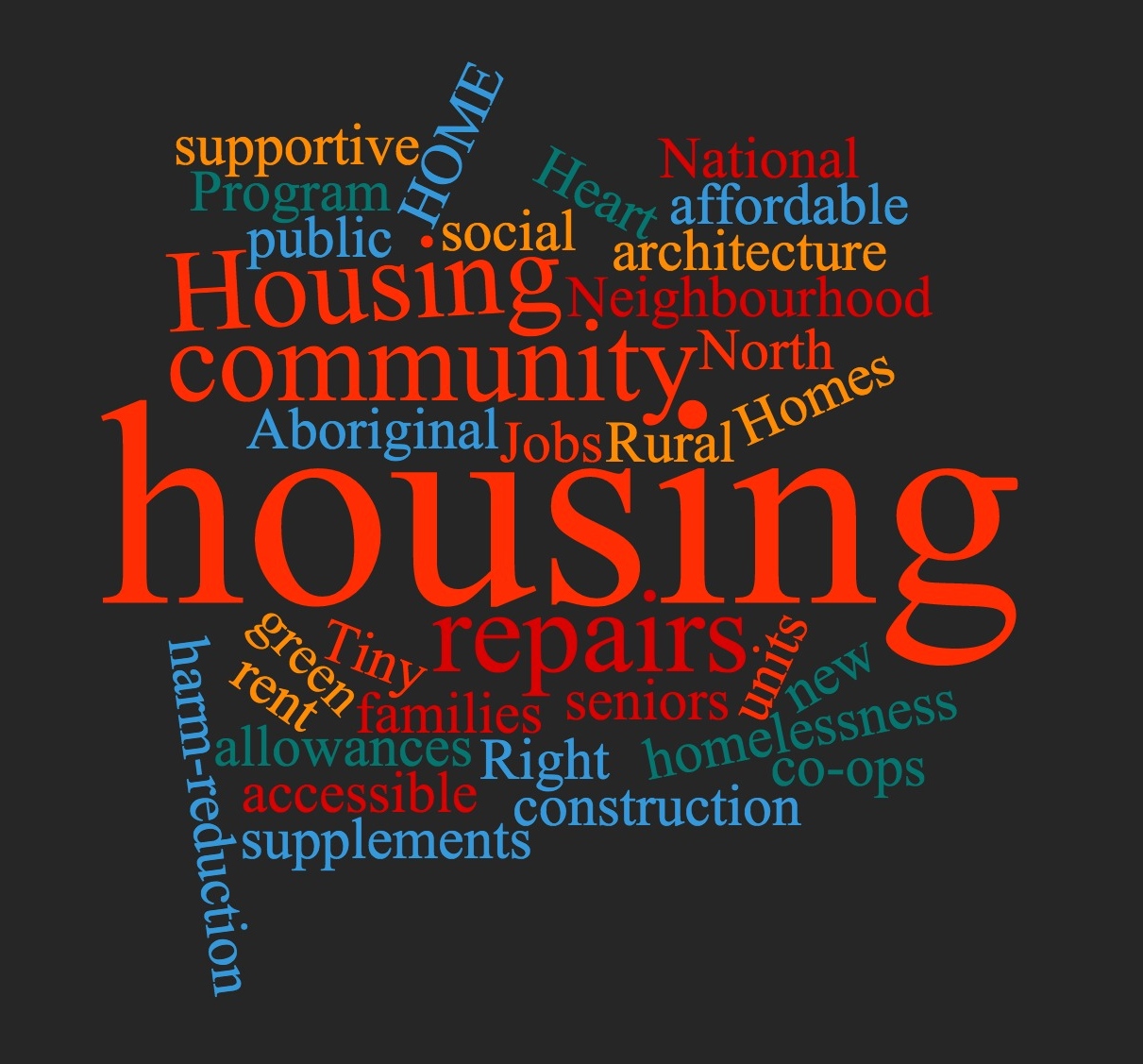Like this article? rabble is reader-supported journalism. Chip in to keep stories like these coming.
1. A National Housing Program. I’m not going to call for a national housing strategy any longer. I want a national housing program. After all, Medicare, our national health care program is not a strategy, it’s a program. Our federal pension and unemployment insurance programs are not strategies, they are national programs. A national housing program can’t be dependent on the whims or political stripes of provincial or territorial premiers or city mayors. It needs to be a federal program, announced and funded in the Liberal’s spring budget with an allocation of $1billion new dollars annually. That’s the amount we used to allocate when we had a national housing program, that is until it was axed back in 1993 by both Conservative and Liberal governments. Let’s get it back.
A word cloud depicting the components of a perfect national housing program would include: right to housing, social housing, affordable, co-ops, accessible, supportive, harm-reduction, new construction, rehabilitation of existing housing, green, rent supplements and housing allowances.
2. A federal Minister of Housing. Maybe I’ll get used to four federal Cabinet ministers with responsibility for housing in their mandate letters (Ministers Amarjeet Sohi, Jean-Yves Duclos, Carolyn Bennett, Bill Morneau) but, call me old fashioned, I want a minister who is actually called the Minister of Housing.
The state of the homelessness disaster, the acute housing shortage and crisis, warrants it.
3. More emergency shelters. Shelter, like housing, must be seen as a human right. Across the country, there is a massive shelter disaster. Municipalities need to start addressing the problem as a human right and respond to the crisis year round by opening more shelters, not just bandaids like warming centres, church basements or 24 hour drop-in programs. In addition, we will have to convince local governments to stop caving to the goliath of gentrification that is resulting in the closure of shelters. I’m hoping that communities that have allocated empty buildings such as schools and hospitals for emergency housing for Syrian refugees will mobilize to hold onto these sites for immediate use as shelter or social housing after the refugees have transitioned into permanent housing.
We’ve done it in the past. Let’s do it again.
4. Learn the lesson that the emperor has no clothes. I hope there will be an end to the obsession with neoliberal policy directions that do little to address the crux of massive social and economic problems. These policy approaches include streets to homes type programs, counting the homeless, de-funding survival supplies like sleeping bags and criminalizing sleeping outside. The mantra (sometimes I call it a fetish) of Housing First programs and Poverty Reduction strategies are little more than smoke and mirrors efforts that divert attention, funding and advocacy from the real solutions: a national housing program, a living wage, and adequate social assistance levels. The terms Housing First and Poverty Reduction are deeply offensive. Without a national housing program Housing First has become a tool for discrimination offering housing only for some. The language of poverty reduction, in such a rich country, is a very low bar.
What you call a problem influences the solution. Let’s be bold and brave. We can create housing for all and we can end poverty.
5. Unfreeze the advocacy chill. For too long now, charities and social service agencies that serve people who have housing needs, have stepped back, way back, from speaking out and doing advocacy on the conditions their clients and communities face. In some cases they fear funding cuts, in some cases they fear the removal of their charitable status by Revenue Canada (this became a legitimate reality during the Harper years), and in some situations the critical analysis and advocacy skills have not been taught, supported or expected as a legitimate part of a worker’s role.
We can change that through political literacy: how to do deputations or media events, how to organize a rally or do action-based research, etc.
6. Insert social justice. This could apply to a lot of sectors such as curriculum at universities and colleges. Notably, faith groups have a long history of fighting for social justice when it comes to housing and homelessness. Some have even built housing and both the Anglican and United Church were part of campaigns for a national housing program. Sadly, in recent years, political ideology has enforced the idea that social programs should be provided by the charitable sector. Faith communities have been expected to deliver what the state should be providing and their congregation and community members stepped up in big numbers. However, there is a danger to not address the heavily weighted role faith groups play in this charitable response to homelessness. The Toronto example of the 30 year-old, faith-based Out of the Cold Program, has unfortunately helped to establish a culture of charity and the acceptance of shelter conditions that do not meet the United Nations standards for refugee camps, let alone the City’s own Shelter Standards. Imagine being forced to spend your night at seven different locations in seven days, not knowing if there will be space for you. You sleep in a common gym type room likely next to strangers on a mat on the floor, maybe with a single blanket or pillow. There is no safe place to keep your things, there are not enough showers or washrooms, and you have to leave first thing in the morning. I can only call this intentional neglect that the city endorses by its inaction. As my friend Dri, from Tent City once said “we wouldn’t let dogs live like that.”
It’s estimated that each faith organization that provides a night of shelter has at least 200 volunteers. Imagine if that force was harnessed for advocacy for proper shelters and housing! That would be social justice.
Image/Cathy Crowe
Like this article? rabble is reader-supported journalism. Chip in to keep stories like these coming.




